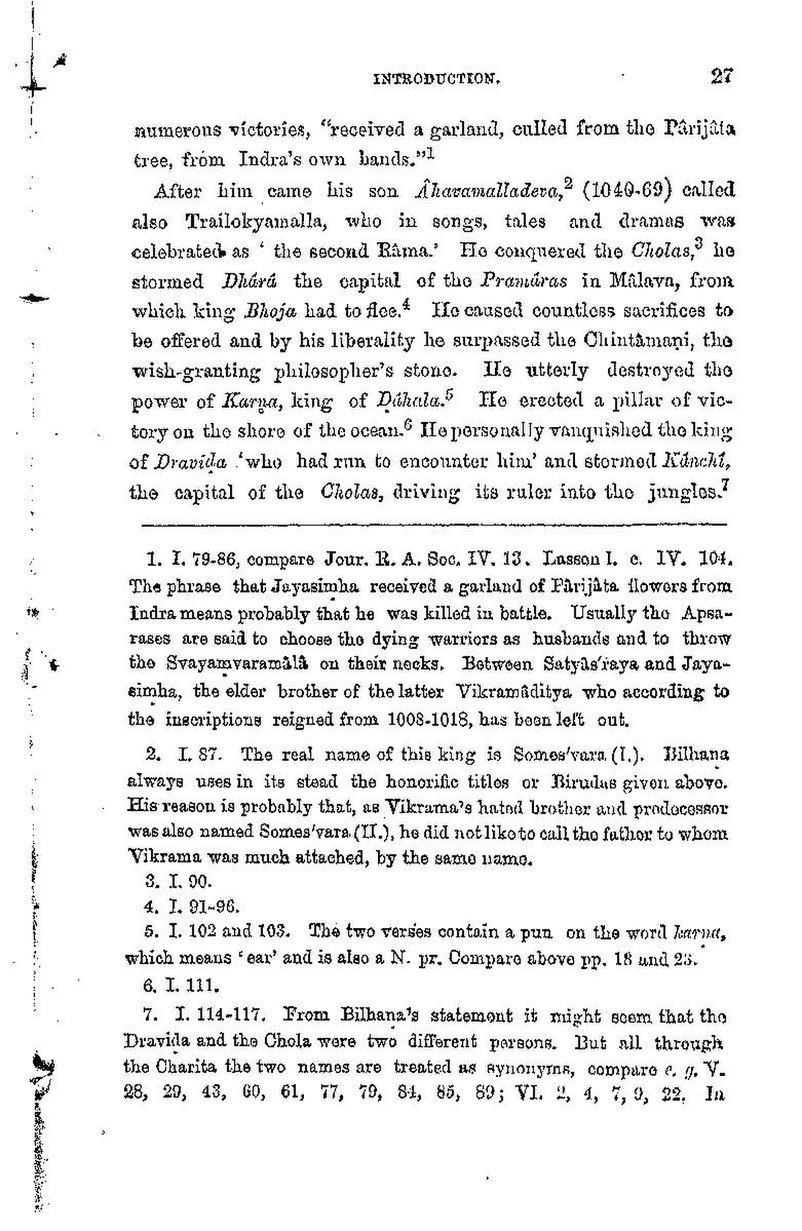INTRODUCTION.
27
numerons víctories, "received a garland, culled from the Parijata
tree, from Indra's own bands."
After him came his son Aharamalladera,2 (1040-69) called
also Trailokyamalla, who in songs, tales and dramas was
celebrated as the second Râma.' Ho conquered the Cholas,³ he
stormed Dhárú the capital of the Pramáras in Málava, from
which king Bhoja had to flee. He caused countless sacrifices to
be offered and by his liberality he surpassed the Chintamani, the
wish-granting philosopher's stono. IIe utterly destroyed the
power of Karna, king of Dihala.5 He erected a pillar of vic-
tory on the shore of the ocean. IIe personally vanquished the king
of Dravida 'who had run to encounter him' and stormed Kanchi,
the capital of the Cholas, driving its ruler into the jungles.7
1. I. 79-86, compare Jour. R. A. Soc. IV. 13. Lasson I. c. IV. 104.
The phrase that Jayasimha received a garland of Parijata flowers from
Indra means probably that he was killed in battle. Usually the Apsa-
rases are said to choose the dying warriors as husbands and to throw
the Svayamvaramålà on their necks. Between Satyas'raya and Jaya-
simha, the elder brother of the latter Vikramaditya who according to
the inscriptione reigned from 1008-1018, has been left out.
2. I. 87. The real name of this king is Somes'vara. (1.). Bilhana
always uses in its stead the honorific titlos or Birudas given above.
His reason is probably that, as Vikrama's hatod brother and prodocessor
was also named Somes'vara (II.), he did not like to call tho futhor to whom
Vikrama was much attached, by the same namo.
3. I. 90.
4. I. 91-96.
5. I. 102 and 103. The two verses contain a pun on the word karna,
which means 'ear' and is also a N. pr. Compare above pp. 18 und 23.
6. I. 111.
7. I. 114-117. From Bilhana's statement it might seem that the
Dravida and the Chola were two different persons. But all through
the Charita the two names are treated as synonyms, compare e. g. V.
28, 29, 43, 60, 61, 77, 79, 81, 85, 89; VI. 2, 4, 7, 9, 22. In
पृष्ठम्:विक्रमाङ्कदेवचरितम् - बिल्हण.pdf/३१
एतत् पृष्ठम् अपरिष्कृतम् अस्ति

